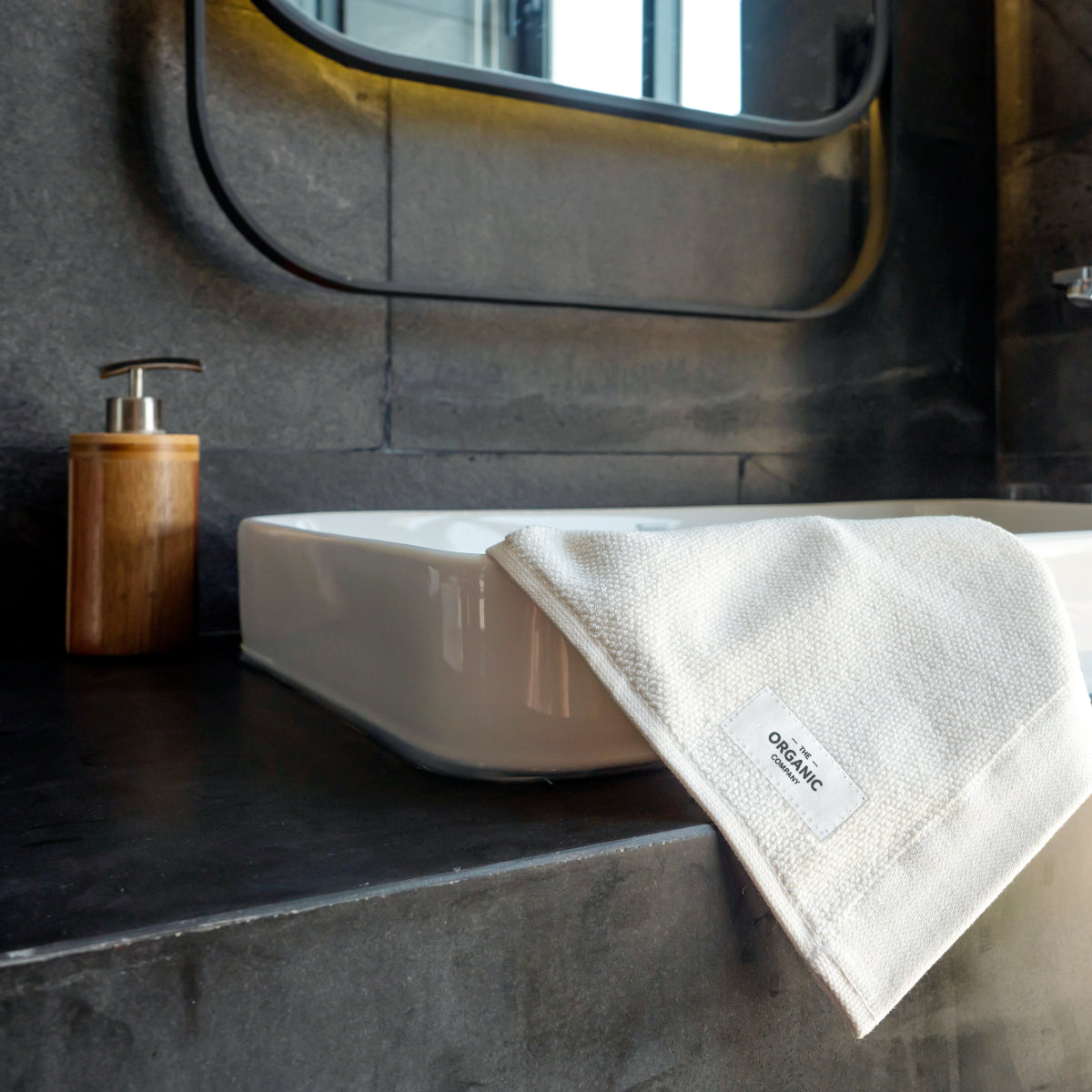Textile care
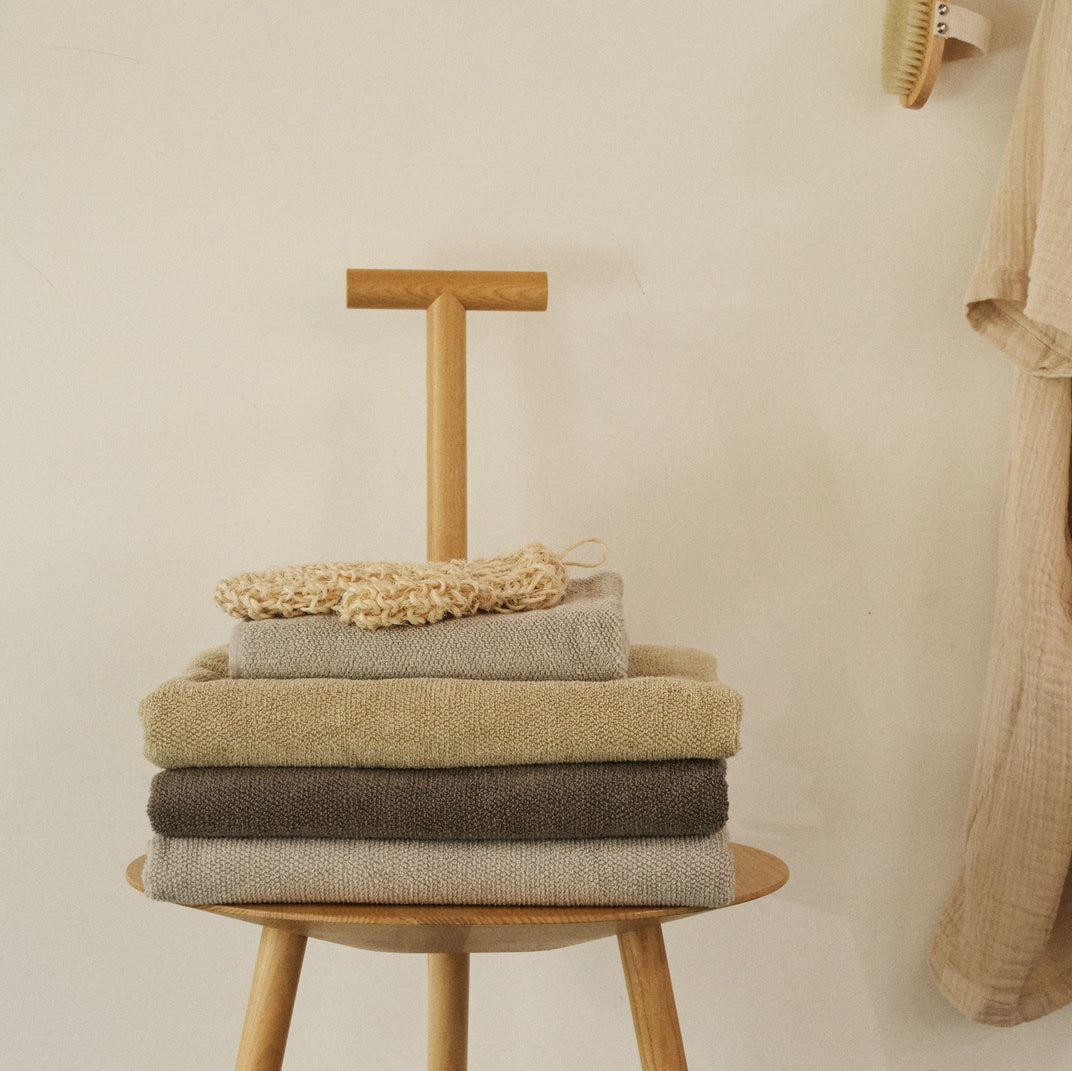
COLOR INFORMATION
Hours of direct sunlight on dark colors will cause them to fade. We
therefore recommend avoiding direct sunlight when you hang your laundry out to
dry, and that you use light-colored textiles when sunbathing.
To make cotton products sun resistant, many harmful chemicals are
required. This is exactly what we try to avoid in our products. It is not good
for the environment or our skin. And even if we wanted to, our strict standard,
GOTS, doesn't allow most of these chemicals anyway.
The sun bleaches naturally and it would take strong chemistry to
stop it, especially since cotton is a natural fiber. If it were plastic, like
polyester, it would be easier to make a final product sun resistant (it would
still contain chemicals though).
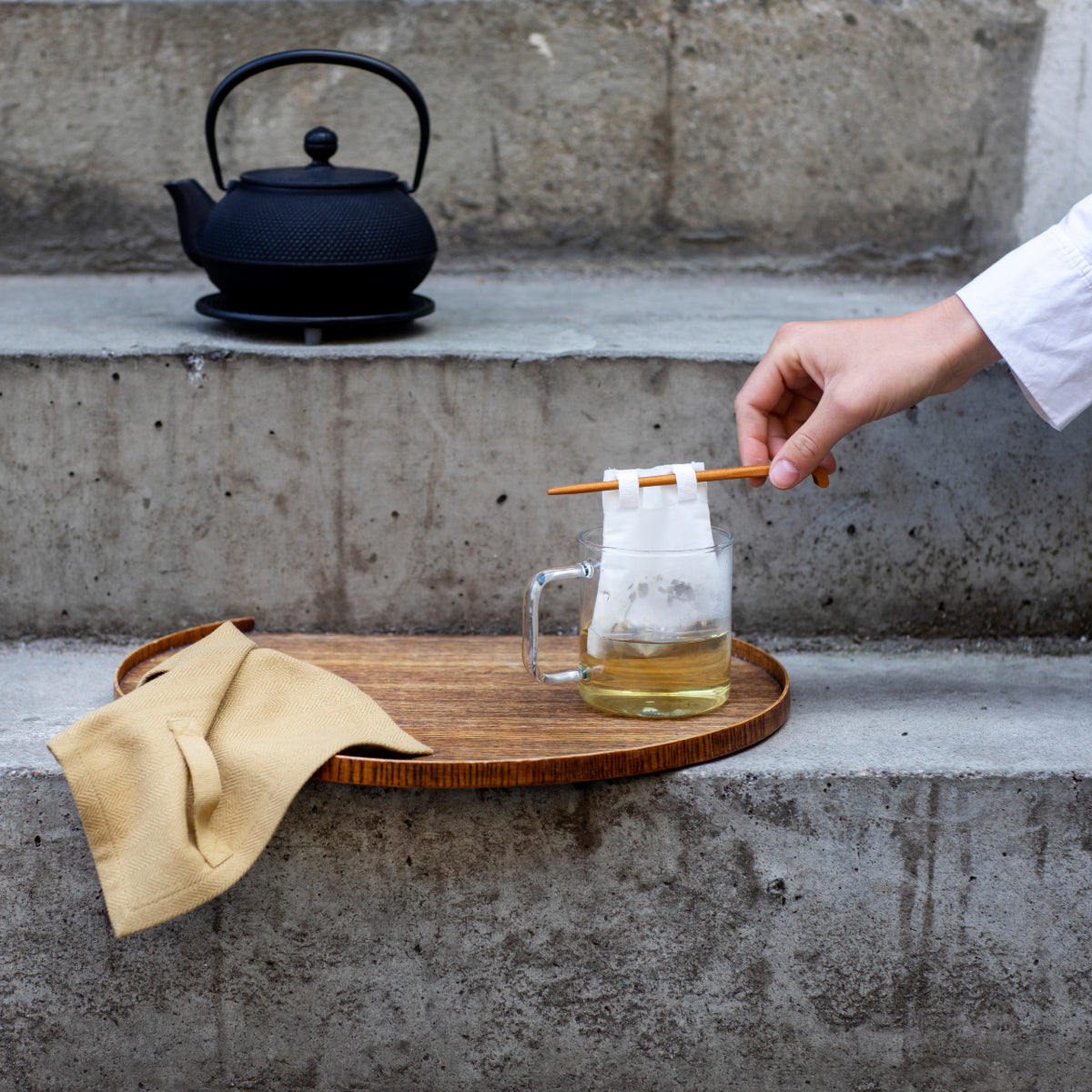
NO SOAKING
Our cotton is GOTS certified. This basically means that we don't add chemicals in the proces that prevent the end products from absorbing. We only use pure starch when weaving and no pesticides or heavy metals in dyeing or harmful chemicals in finishing.
So whilst other brands may recommend soaking a dishcloth or tea towel for 24-48 hours before use to become more absorbent, this is not the case
with our products.
This is because cotton is very absorbent as a starting point. A reduced absorbency in other products can be due to: The way the yarn was processed before weaving. Chemical treatment of the cotton. Residues from the
processing and dyeing of the textile, etc.
So, in general, you do not need to soak our products, and you can use them immediately. How convenient!
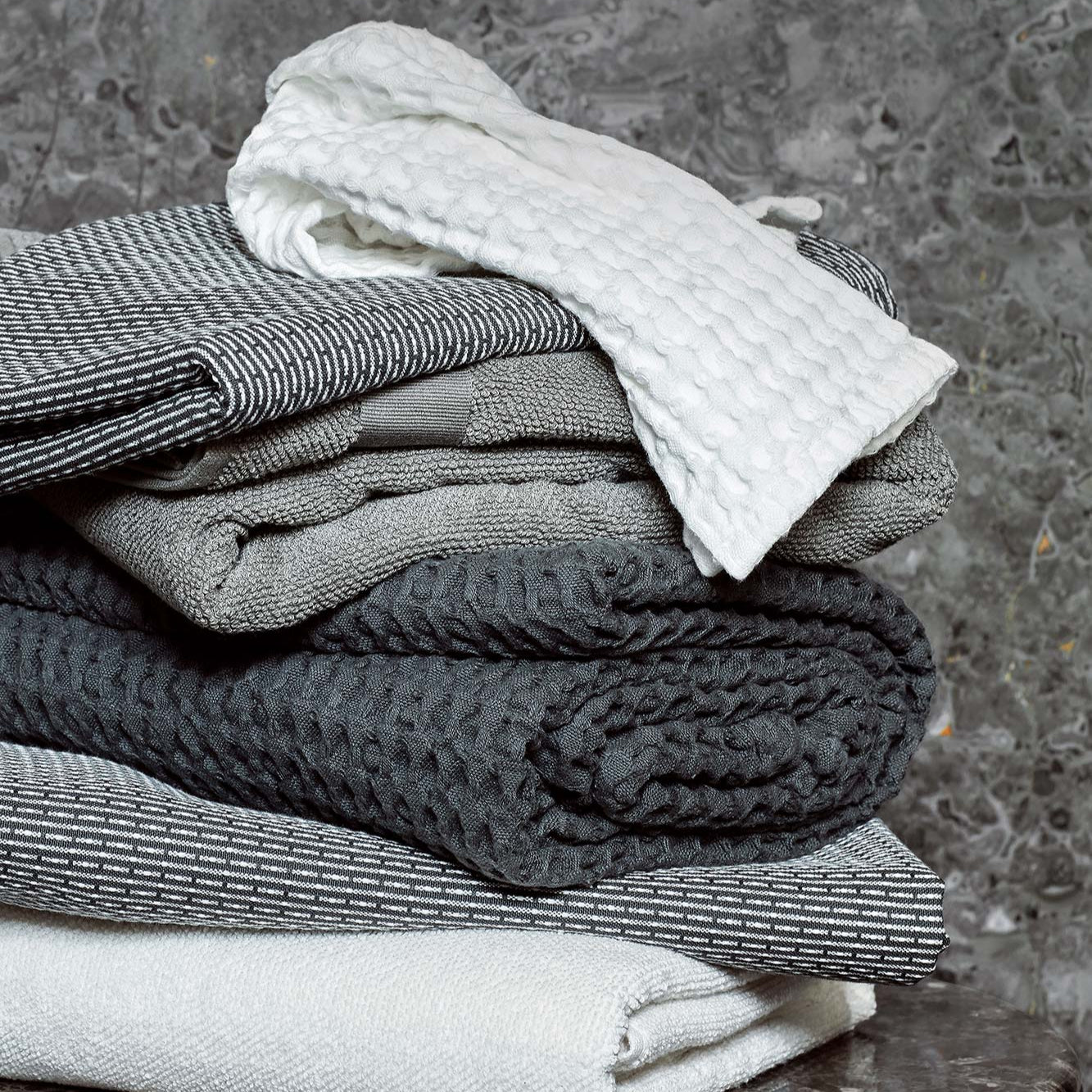
REPAIR IS THE NEW BLACK
Have you ever thought about repairing your textiles? Our products are made to last years and years to come, but if it so happens that they brake, there is a great solution for that!
In order to overcome the massive consumption of resources, we better start buying less and better and repairing what we have already acquired.
Holes can be easily repaired, and if you value aesthetics, you can try some Japanese sewing techniques, e.g. Sashiko. We sell kits that have a instruction inside the box to help you explore the wonders of mending.
OUR TEXTILES
Cotton, both conventional and organic, is a natural fiber and can be processed in a wide variety of ways. Cotton can be boiled as well as tumble dried until crisp. But the higher the temperature when you dry, the more you shorten the life of the product as well as shrink your cotton product (more than usual), whether it's a towel or a shirt.
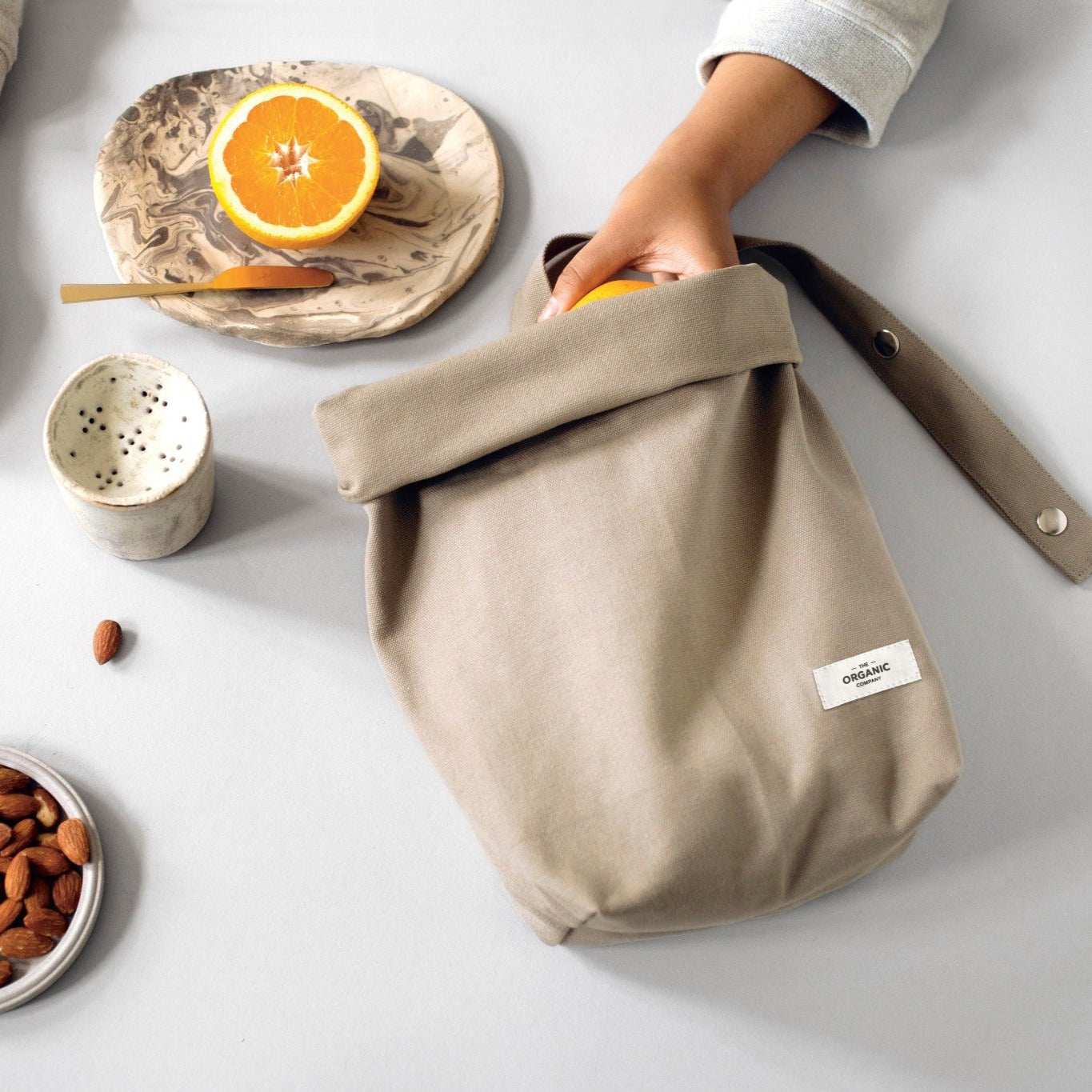
HEAVY CANVAS
Canvas is sensitive to stains, sunlight and cannot handle being soaked for too long. It will lose some of its natural stiffness and develop an uneven texture. That said, canvas is strong, long lasting and will age gracefully.
Washing/Care Instructions
Materials: 100% GOTS certified organic cotton
✓ Canvas and heavy canvas are not exactly the same, but have some similar washing instructions. And both are tightly woven. It is always a good idea to treat and wash stains immediately. No need to prewash; It is organic.
✓ Machine wash at 20 to 60°C (68-140 F) (only wash canvas when absolutely necessary, try surface washing first).
✓ When washing canvas, visible marks/folds will appear as the fabric is dense.
✓ Wash at the lowest possible temperature.
✓ Use environmentally friendly detergents.
✓ Wash inside out.
✓ Do not tumble dry.
✓ Hang to air dry on a clothesline to dry naturally.
✓ Avoid using fabric softener as this reduces the absorbency of the product and most fabric softeners are harmful to nature (if not 100% purified in a wastewater treatment plant). Instead of fabric softener, you can add a small amount of distilled clear vinegar to the rinsing process. The vinegar will help remove residues from detergent or limescale.
✓ Avoid using bleach (alone and in detergent) as this affects the colours.
✓ Wash with similar colours.
✓ Stretch slightly into shape after washing.
✓ Smooth the textiles by hand while they are wet and again when they are dry.
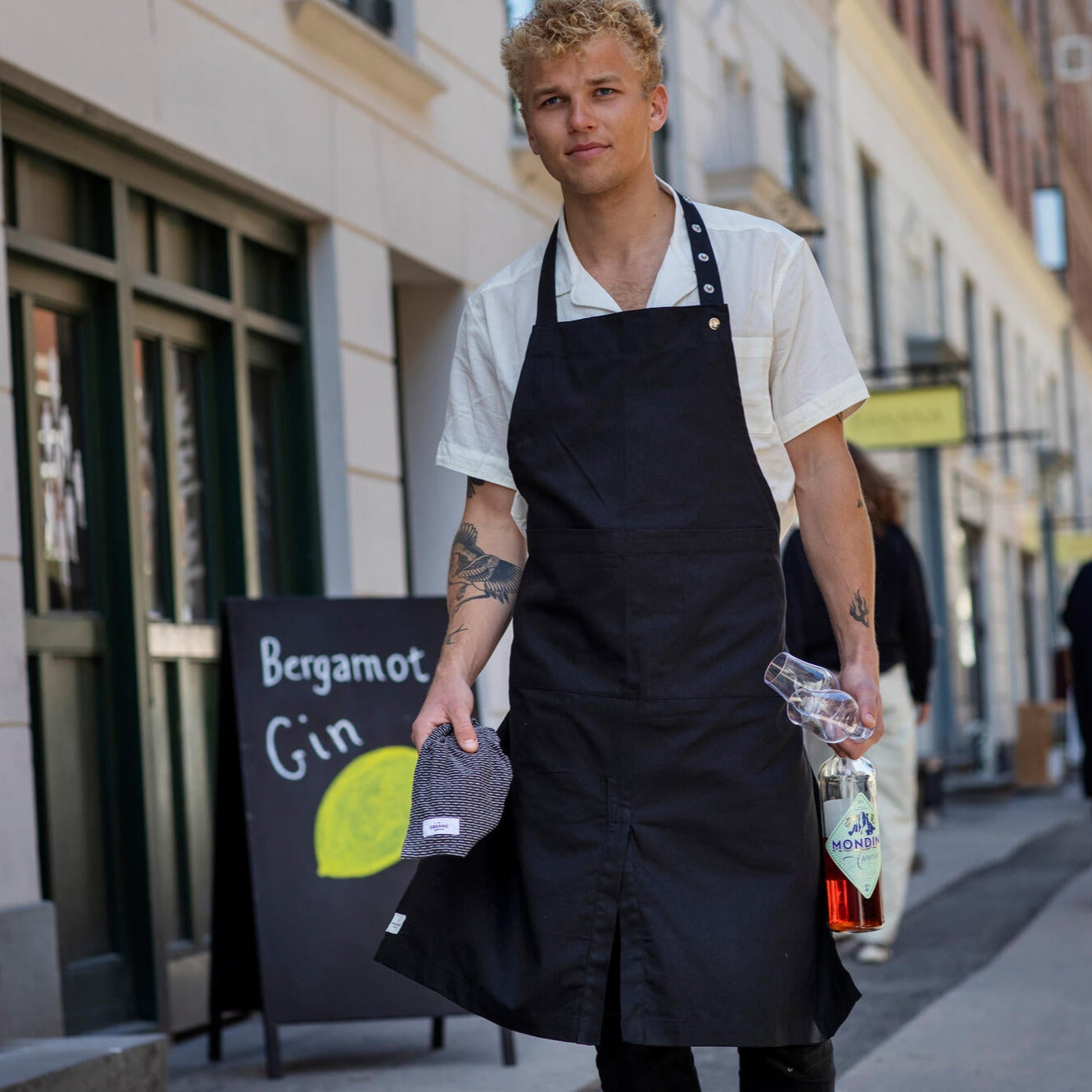
TWILL
The twill weave has many good qualities and is known for its strength. It has high tear and shrink resistance, absorbency and durability. And because of this structure, twill will generally drape beautifully.
Washing/care instructions
Material/fabric: 100% GOTS certified organic cotton.
✓ To preserve the finish of the fabric for as long as possible, avoid soaking, wringing, rubbing, bleaching or tumbling. No need to pre-wash; It is not necessary and at the same time it burdens the environment unnecessarily.
✓ Machine wash at 20 to 60°C (68-140 F) Use environmentally friendly detergents.
✓ Before washing, you can tie the apron straps together in a tight loop with short ends to prevent them from tangling with other clothes in the washing machine.
✓ Do not put in the dryer.
✓ Hang to air dry to dry naturally.
✓ Avoid using fabric softener as this reduces the product's absorbency and most fabric softeners are harmful to nature (if not 100% purified at wastewater treatment plants). Instead of fabric softener, you can add a small amount of distilled clear vinegar to the rinse cycle. The vinegar will help remove detergent or limescale residue.
✓ Avoid using bleach (alone and in detergent) as it affects colors.
✓ Wash with similar colors.
✓ Stretch lightly after washing.
✓ Smooth fabrics by hand while wet and again when dry.
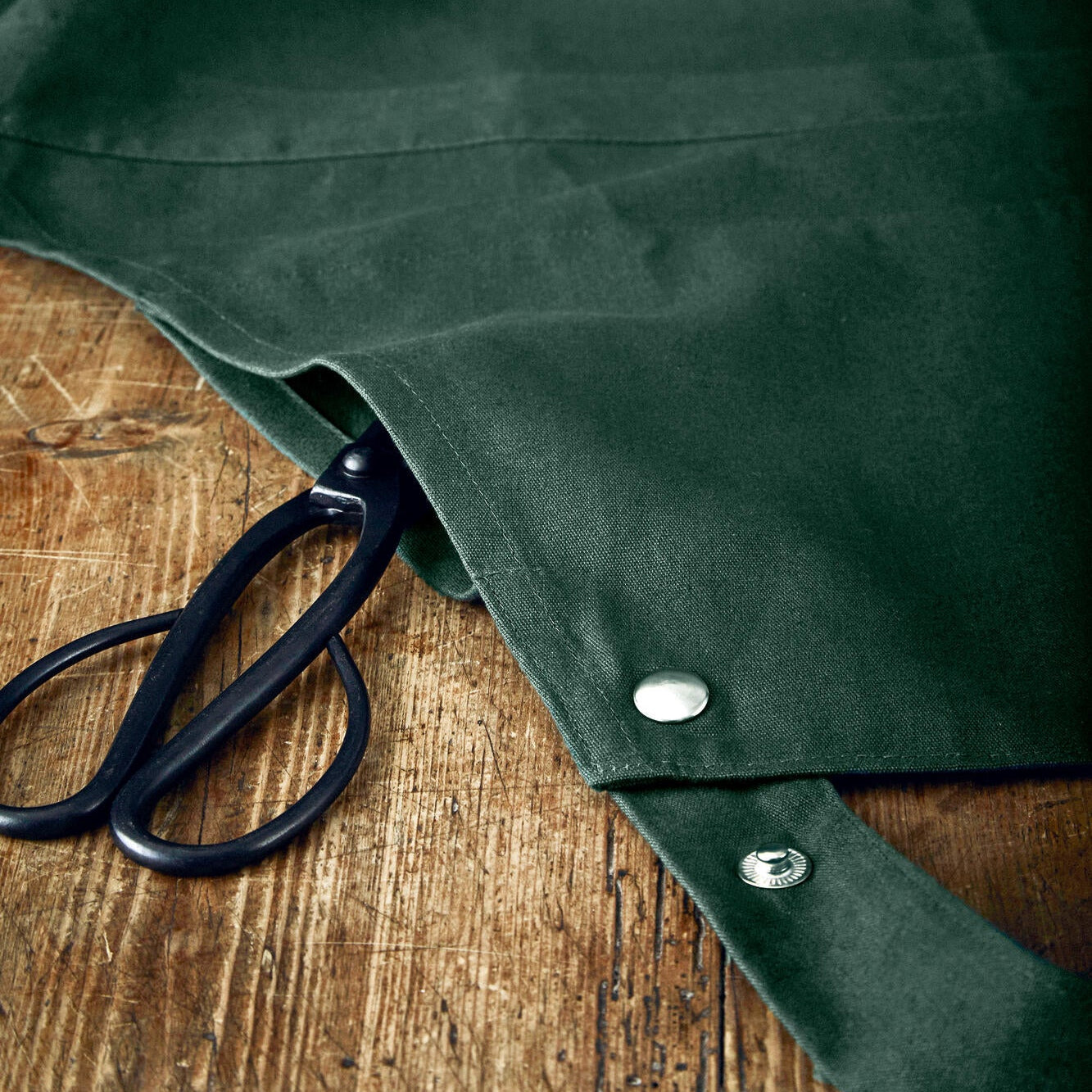
CANVAS
Canvas is sensitive to stains, sunlight, and cannot handle being soaked for too long. It will lose some of its natural stiffness and develop an uneven texture. That said, canvas is strong, long-lasting, and will age gracefully.
Washing/care instructions
Material/fabric: 100% GOTS certified organic cotton.
✓ Canvas and heavy canvas are not exactly the same, but have some similar washing instructions. And both are tightly woven. It is always a good idea to treat and wash stains immediately. No need to prewash; It is organic.
✓ Machine wash at 20 to 60°C (68-140 F) (only wash canvas when absolutely necessary, try a surface wash first).
✓ When washing canvas, visible marks/folds will appear as the fabric is dense.
✓ Wash at the lowest possible temperature.
✓ Use environmentally friendly detergents. ✓ Wash inside out.
✓ Do not tumble dry
✓ Hang to dry naturally.
✓ Avoid using fabric softener as this reduces the product's absorbency and most fabric softeners are harmful to nature (if not 100% purified at a wastewater treatment plant). Instead of fabric softener, you can add a small amount of distilled white vinegar to the rinse cycle. The vinegar will help remove some detergent or limescale residue.
✓ Avoid using bleach (alone and in detergent) as it affects colors.
✓ Wash with similar colors.
✓ Stretch gently after washing.
✓ Smooth fabrics by hand while wet and again when dry.
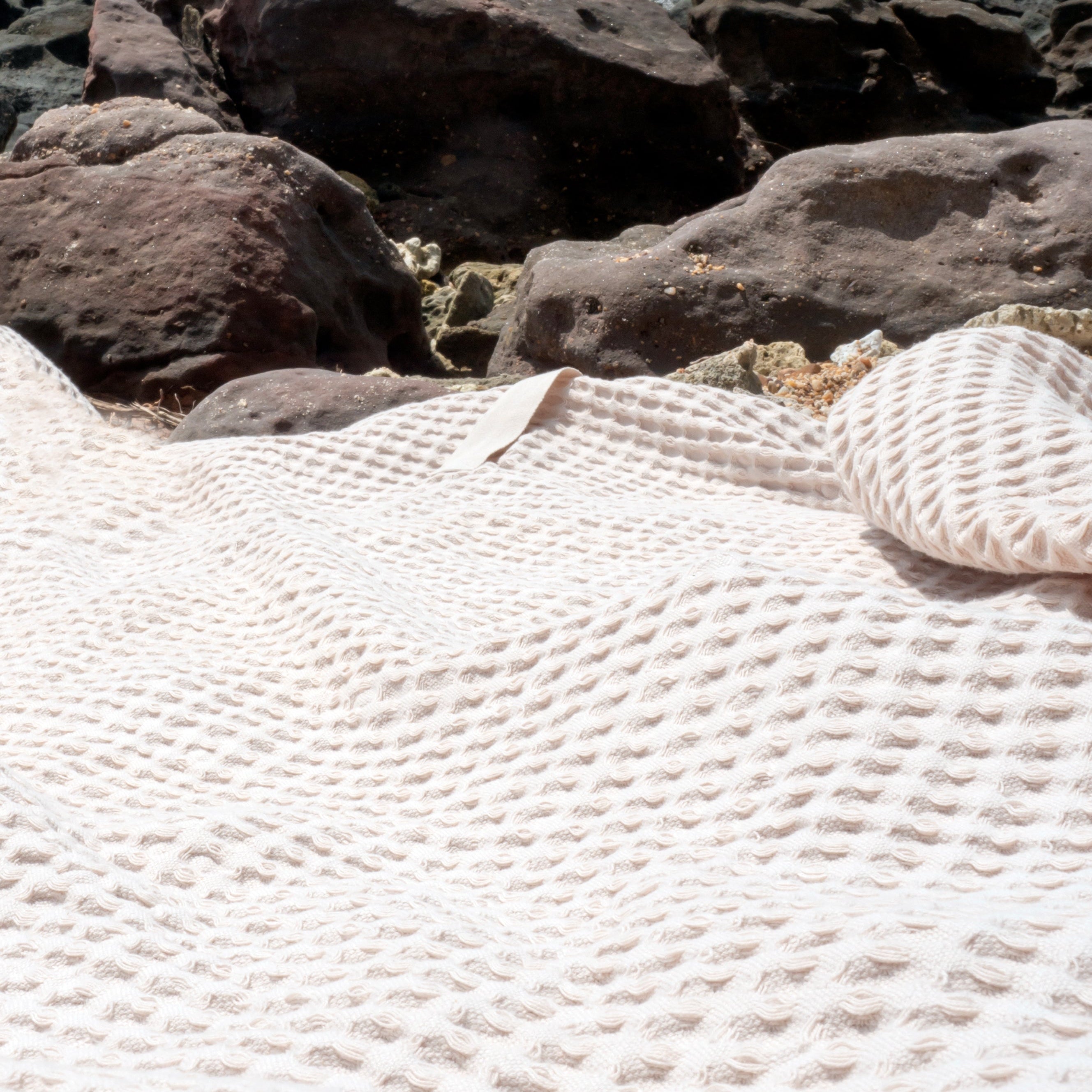
BIG WAFFLE
Waffle is a lightly woven fabric (also known as honeycomb) where the pattern runs either vertically, horizontally or both, creating a square design, hence the name waffle. This weave is absorbent, lively and quick drying.
Washing/care instructions
Material/fabric: 100% GOTS certified organic cotton.
✓ No need to pre-wash; it is organic and already absorbent.
✓ Machine wash at 20 to 60°C.
✓ Wash at the lowest possible temperature.
✓ Use environmentally friendly detergents.
✓ Tumble dry on low heat, or use dryer balls if necessary to shorten the drying time.
✓ Do not tumble dry.
✓ Hang to dry naturally.
✓ Avoid using fabric softener as this reduces the product's absorbency and most fabric softeners are harmful to nature (if not 100% purified at a wastewater treatment plant).
✓ Instead of fabric softener, you can add a little distilled white vinegar to the rinse cycle. The vinegar will help remove some detergent or limescale residue.
✓ Avoid using bleach (alone and in detergent) as this affects the colors.
✓ Wash with similar colors.
✓ Stretches easily into shape after washing.
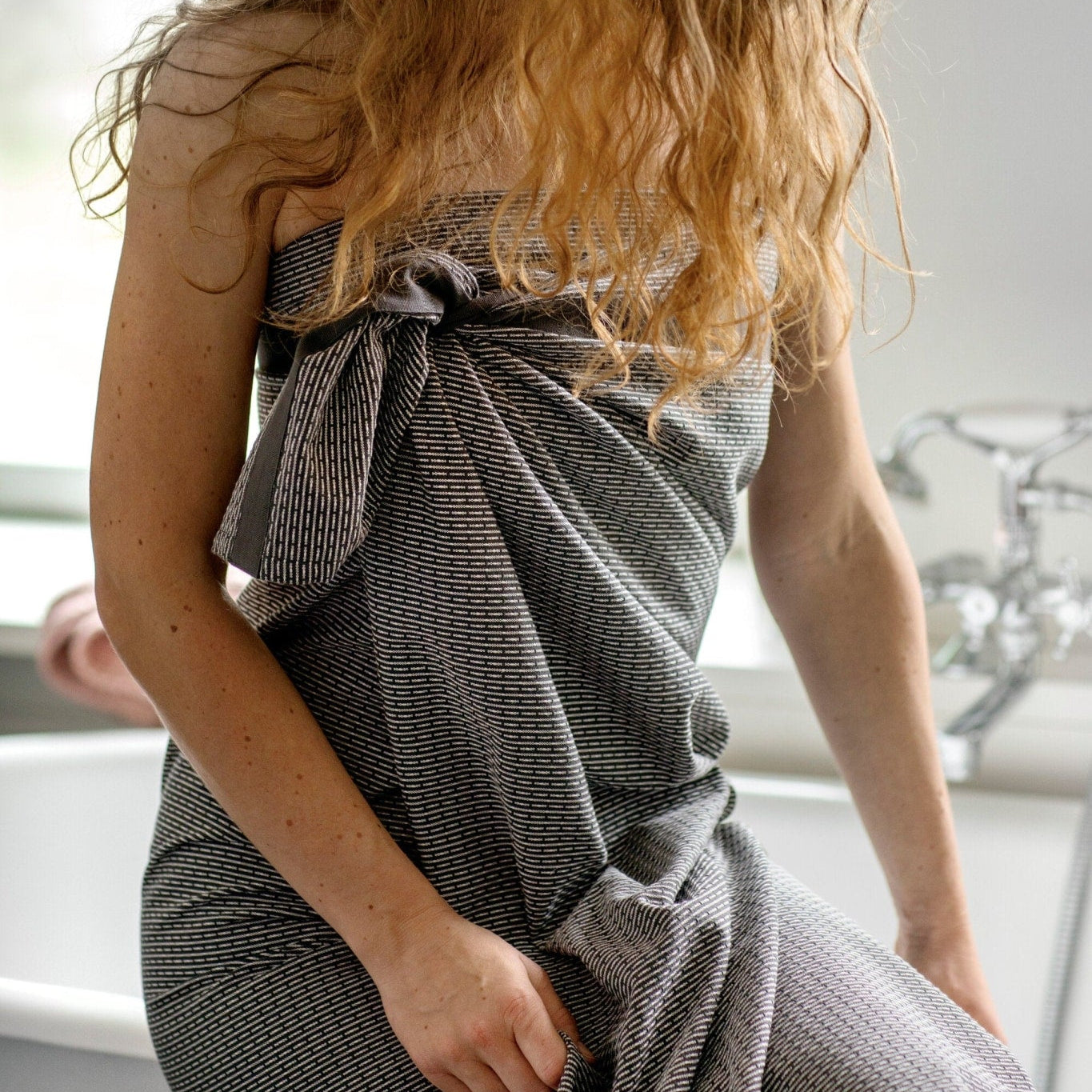
PIQUÉ
The piqué weave (part of the dobby weave family) is characterized by small geometric patterns that create extra texture in the fabric. It is lightweight and quick-drying. If washed and tumble dried at high temperatures, the fabric will and may shrink more than the usual 3-8%.
Washing/care instructions
Material/fabric: 100% GOTS certified organic cotton.
✓ No need to pre-wash; it is organic and already absorbent.
✓ Machine wash at 20 to 60°C.
✓ Wash at the lowest possible temperature.
✓ Use environmentally friendly detergents.
✓ Tumble dry on low heat, or use dryer balls if necessary to shorten the drying time.
✓ Do not tumble dry.
✓ Hang to dry naturally.
✓ Avoid using fabric softener as this reduces the product's absorbency and most fabric softeners are harmful to nature (if not 100% purified at a wastewater treatment plant). Instead of fabric softener, you can add a small amount of distilled white vinegar to the rinse cycle. The vinegar will help remove some detergent or limescale residue.
✓ Avoid using bleach (alone and in detergent) as this affects the colors.
✓ Wash with similar colors.
✓ Stretch slightly after washing.
✓ Smooth the textiles by hand after they are folded.
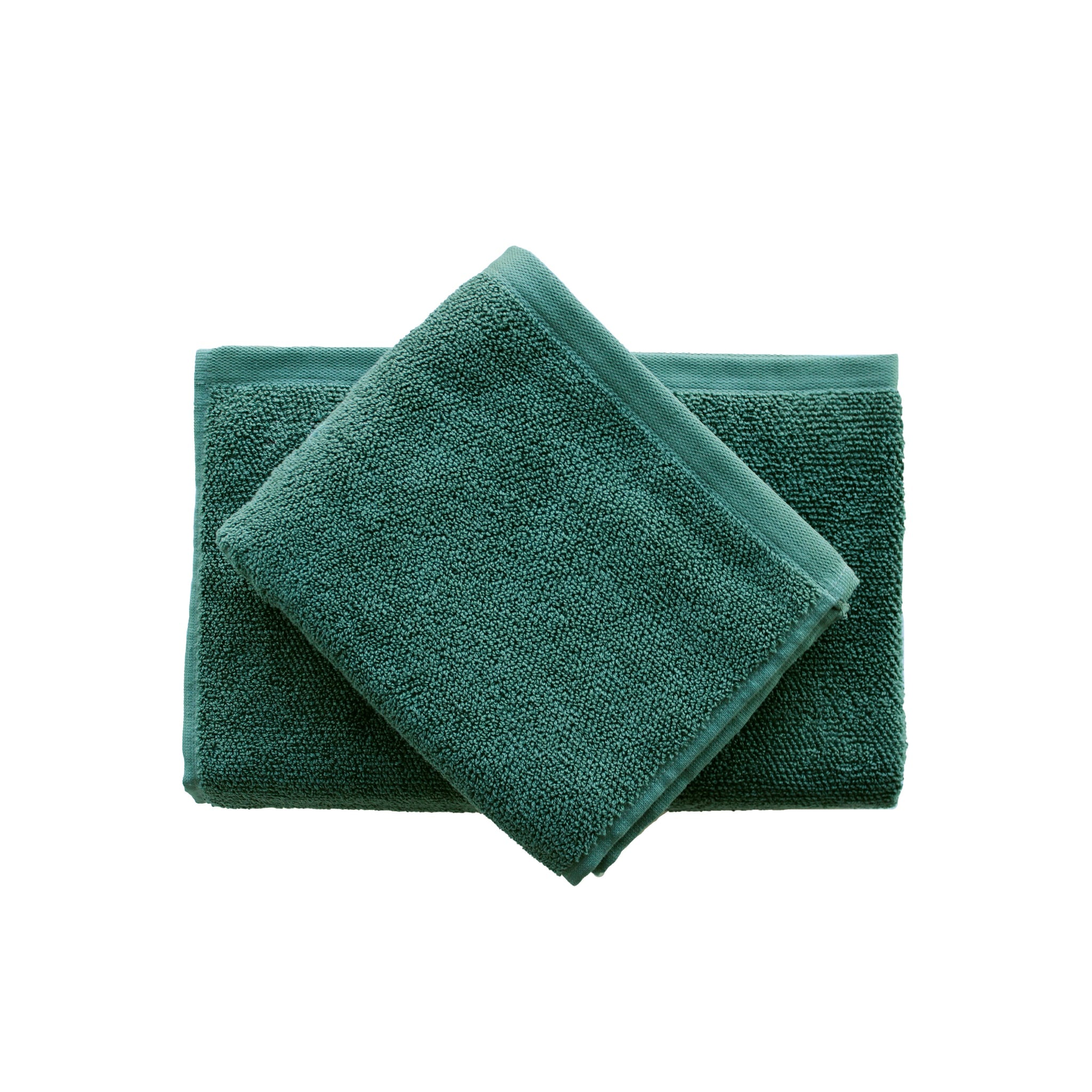
TERRY
Terry is a woven fabric with many short loops of thread, creating a soft and absorbent surface with a classy look.
Washing/care instructions
Material: 100% GOTS certified organic cotton.
✓ No need to pre-wash; it is organic and already absorbent.
✓ Machine wash at 20 to 60°C.
✓ Wash at the lowest possible temperature.
✓ Use environmentally friendly detergents.
✓ Tumble dry on low heat, or use dryer balls if necessary to shorten the drying time.
✓ Do not tumble dry.
✓ Hang to dry naturally.
✓ Avoid using fabric softener as this reduces the product's absorbency and most fabric softeners are harmful to nature (unless 100% purified at a wastewater treatment plant). Instead of fabric softener, you can add a small amount of distilled white vinegar to the rinse cycle. The vinegar will help remove some detergent or limescale residue.
✓ Avoid using bleach (alone and in detergent) as this affects the colours.
✓ Wash with similar colours.
✓ Stretch gently after washing.
✓ Smooth the textiles by hand when folded.
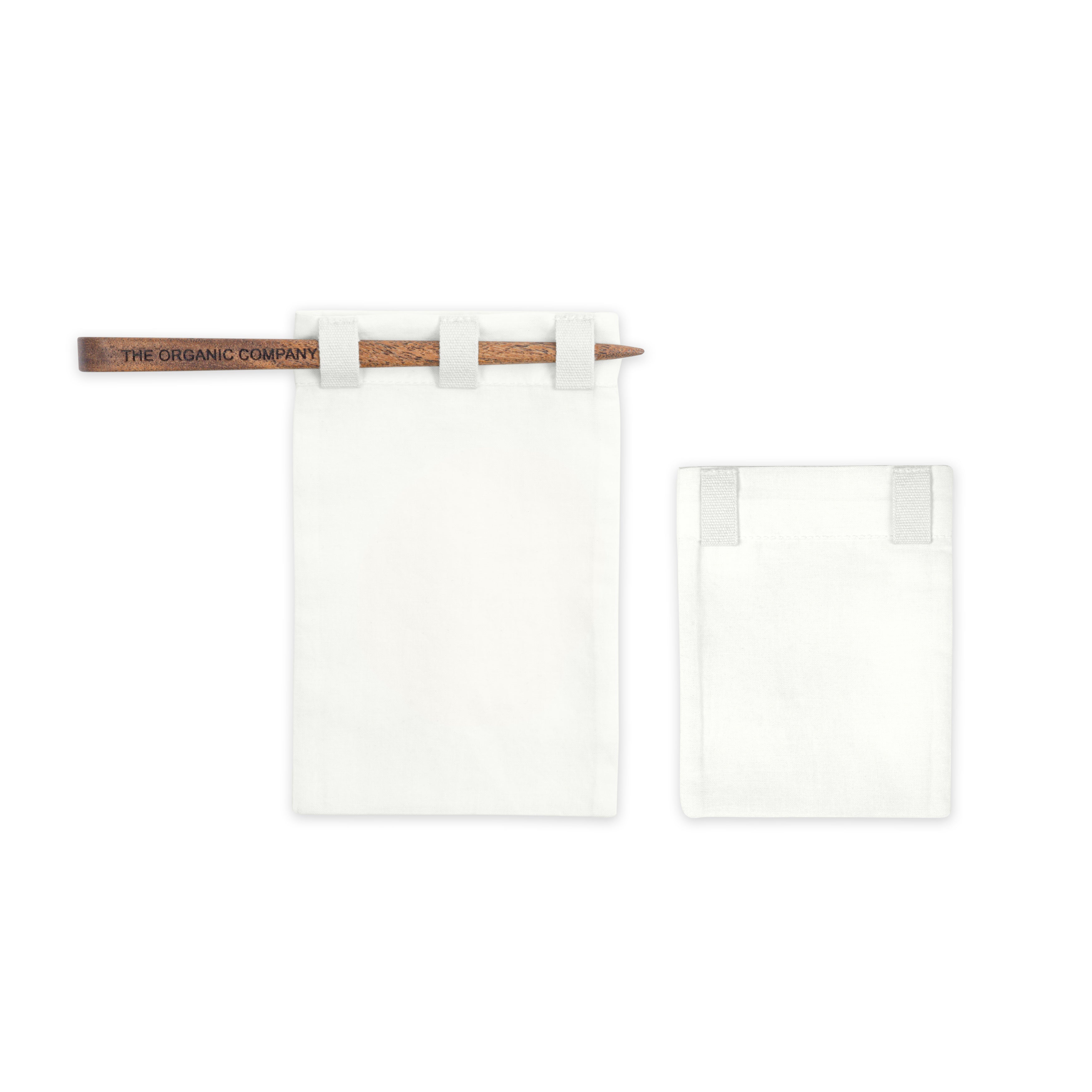
VOILE
Voile is a soft, sheer and sheer fabric. Voile is woven with thin threads (yarn), resulting in a material that is quite light and semi-transparent.
Washing/care instructions
Material/fabric: 100% GOTS certified organic cotton.
✓ You can pre-wash this item or rinse it in boiled water to remove residues of natural starch from production.
✓ The starch is harmless, but it may leave a slight aftertaste in your tea.
✓ Machine wash at 20 to 60°C.
✓ Wash at the lowest possible temperature.
✓ Use environmentally friendly detergents. ✓ Tumble dry on low heat, or use dryer balls if necessary to shorten the drying time.
✓ Do not tumble dry.
✓ Hang to dry naturally.
✓ Avoid using fabric softener as this reduces the product's absorbency and most fabric softeners are harmful to nature (if not 100% purified at wastewater treatment plants). Instead of fabric softener, you can add a small amount of distilled white vinegar to the rinse cycle. The vinegar will help remove some detergent or limescale residue.
✓ Avoid using bleach (alone and in detergent) as this affects colors.
✓ Wash with similar colors.
✓ Stretch lightly after washing.
✓ Smooth the textiles by hand when folded.
* The wooden stick should be washed by hand.
* Tea bags: Food safe, approved by the Danish Veterinary and Food Administration.
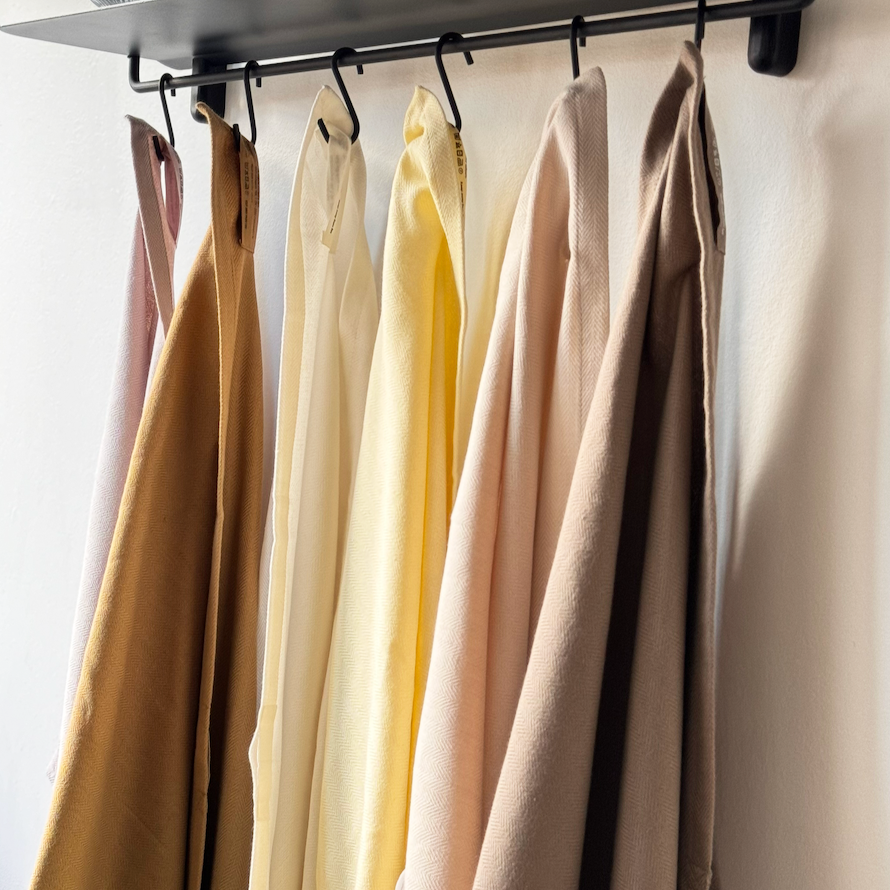
HERRING BONE
Herringbone describes a distinctive V-shaped weave pattern and resembles the skeleton of a herring fish (hence the name). Herringbone is a traditional weaving technique that has been used for centuries and is known for its shape retention, long-lastingness and its ability to absorb moisture. The weaving technique is often seen in woolen clothing such as suits and jackets, but due to the uniqueness and qualities of the weave, we find it perfect for some of our products.
Washing/care instructions
Material/fabric: 100% GOTS certified organic cotton.
✓ No need to pre-wash; it is organic and already absorbent.
✓ Machine wash at 20 to 60°C.
✓ Wash at the lowest possible temperature.
✓ Use environmentally friendly detergents.
✓ Tumble dry at low heat, or use dryer balls if necessary to shorten the drying time.
✓ Do not tumble dry.
✓ Hang to dry naturally.
✓ Avoid using fabric softener as this reduces the product's absorbency and most fabric softeners are harmful to nature (if not 100% purified at a wastewater treatment plant). Instead of fabric softener, you can add a small amount of distilled white vinegar to the rinse cycle. The vinegar will help remove some detergent or limescale residue.
✓ Avoid using bleach (alone and in detergent) as this affects the colors.
✓ Wash with similar colors.
✓ Stretch gently into shape after washing.
✓ Smooth the textiles by hand when folded.
* Meditation Mattress: Unzip the mattress and wash the cover only. Surface wash the mattress only.
WHY ARE THERE HOLES IN MY KITCHEN TOWEL?
Holes in kitchen towels often appear when sharp kitchen knives are washed by hand. The sharp points can cut the fabric and leave small holes. The weave structure prevents the holes from getting bigger with normal use. So we suggest leaving it as is, otherwise you can always repair it.
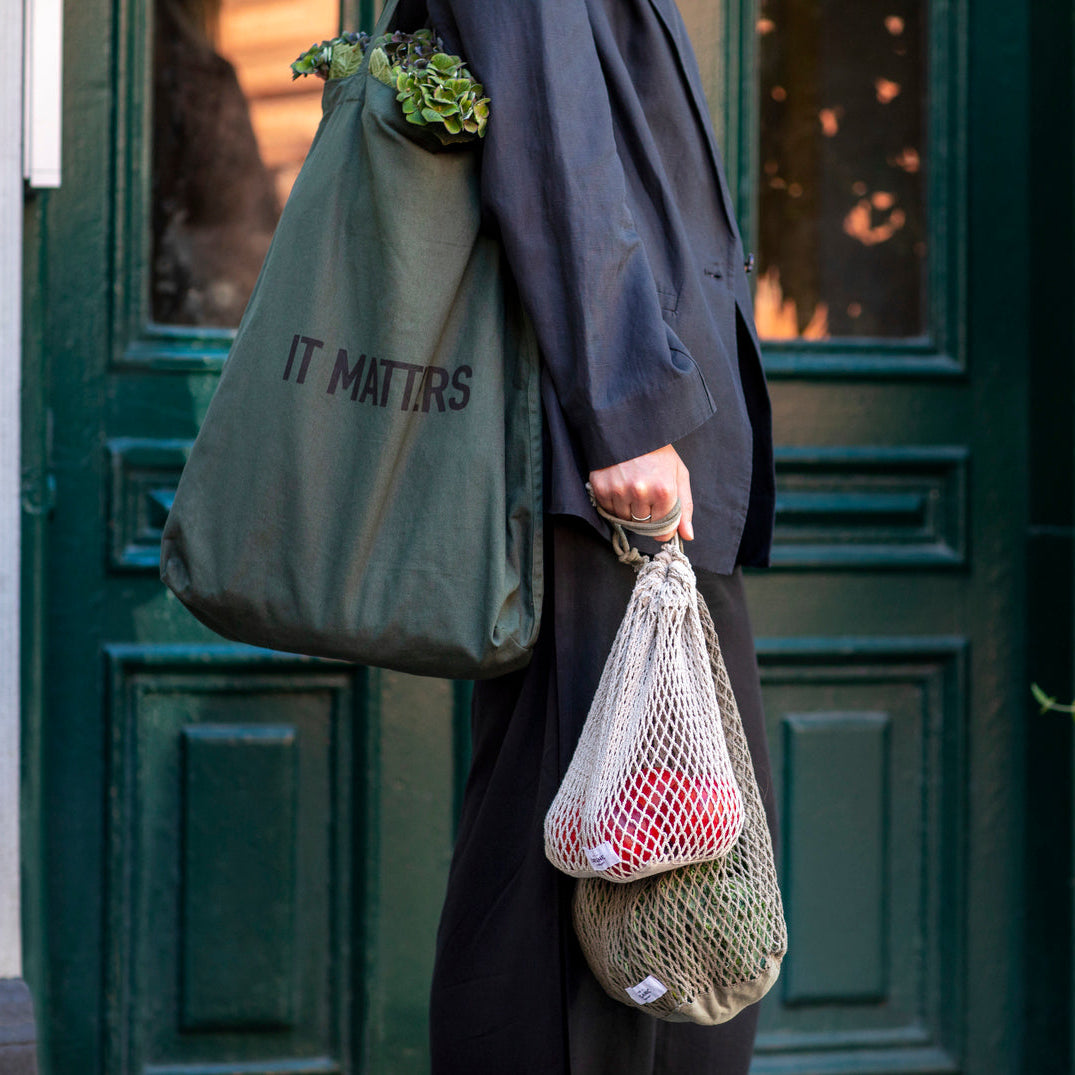
PLAIN WEAVE
Plain weave, also known as tabby or linen weave, is a basic weave and probably the most frequently used in interior textiles and fashion.
Washing/care instructions
Material: 100% GOTS certified organic cotton.
✓ No need to pre-wash; it is organic.
✓ Machine wash at 20 to 60°C.
✓ Wash at the lowest possible temperature.
✓ Use environmentally friendly detergents.
✓ Dry on low heat, or use dryer balls to shorten the drying time.
✓ Do not tumble dry.
✓ Hang to dry naturally.
✓ Avoid using fabric softener as this reduces the product's absorbency and most fabric softeners are harmful to nature (if not 100% purified at a wastewater treatment plant). Instead of fabric softener, you can add a small amount of distilled white vinegar to the rinse cycle. The vinegar helps to remove residues from the detergent or limescale.
✓ Avoid using bleach (alone and in detergent) as this affects the colours.
✓ Wash with similar colours.
✓ Stretch slightly after washing.
✓ Smooth the textiles by hand when folded.

